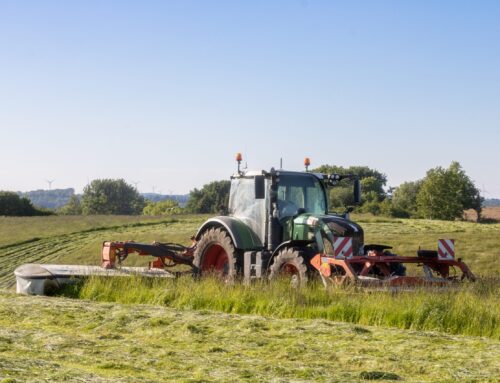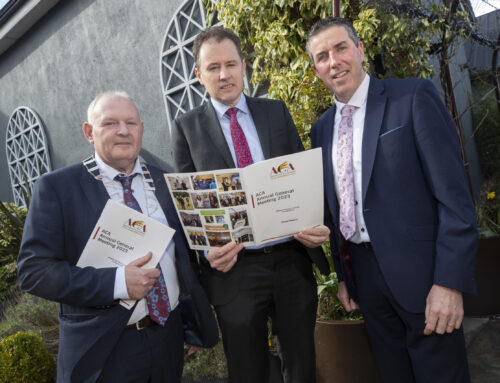The third edition of the Targeted Agricultural Modernisation Scheme (TAMS) opened yesterday as farmers can look forward to new investment items including underpasses, farm roadways and heat detection aids part of the new package. Agri Insider spoke with Dermot Grogan of the DAFM about the new scheme, advice and its exemptions, while Noel Feeney of the Agricultural Consultants Association and Gerry Carty of Moonsyst gave us their reaction.
TAMS is an important aid designed to provide funding for capital investments on farms and will be in place for five years with a budget of €370 million. Tranche 1 of the scheme opens today with solar panels on farms, the first available investment. The other investments will become available on a phased basis during Tranche 1 which is set to close on 16 June.
Positive Response
Dermot Grogan is the Agricultural Inspector (TAMS HQ) at the Department of Agriculture, Food and the Marine. On yesterday’s announcement he said: “Our emphasis would be on farmers to get themselves up to speed with new regulations coming down the track. This is a chance for everybody concerned to reach the goals that have been set in the Climate Action Plan. How are we meeting the environmental targets, energy reduction, health & safety and animal welfare, those are the things that we’re highlighting in the TAMS scheme for the future.”
Noel Feeney is President of the Agricultural Consultants Association (ACA), the representative body for private agricultural consultants and advisors. He is positive about the new TAMS, he said: “Our members throughout the country have been sending enquiries since January. There is a huge appetite out there for investment and machinery, especially with the increase in the amount of people in the Organic Farming Scheme. The old TAMS schemes have been a huge help to farmers, so our feedback is entirely positive.”
Government priorities
Commenting on the new iteration, Minister McConalogue said: “TAMS continues to be a hugely beneficial scheme for farmers, and I am delighted that it will continue in 2023 in a much bigger and better way than previously. TAMS will continue to support productive farming and helping ensure that we remain a modern and futureproofed sector. We are also using TAMS to align more with our climate and sustainability goals through renewable energy, low emission spreading equipment and higher grant rates for organic farmers.”
The government has paid particular attention to the Organic Farming Scheme, with confirmation of an increased rate of 60% grant aid under the Organic Capital Investment Scheme for 2023. Emphasis on renewable energy is welcomed as solar investments will be ring fenced with its own investment ceiling of €90,000 and will be grant-aided at the rate of 60% helping farmers to generate their own power. Farm safety has also been prioritised as options like replacing old slats, installing better handling units and upgrading farmyard lighting on offer at 60%
Other new equipment include bovine fencing, automatic drafting system, milk recording equipment, backup PTO generators, upgrade of water supply on farms with solar and nose pumps, pasture management machinery, including soil aerators, biomass storage, a range of pesticide reduction equipment and a new focus on the equine sector.
Fertility
Dairy farmers will be particularly pleased about the announcement as they can look forward to avail of automated heat detection aids as part of the new package for the first time. Health and fertility monitoring units including collars, tags and boluses come in at €112.25 per unit while the base station (including software) comes in at €2,833. Reacting to the news, Chief Agricultural Technologist with Moonsyst, Gerry Carty said: “With labour shortage an ongoing issue on farms and where sustainable farming is the ultimate target, the addition of technologies like the Moonsyst health and heat detection monitoring will be a welcome support to both beef and dairy farmers with grant funding now available.”
Exemptions
As has been reported dribble bars in relation to the Low Emission Slurry Spreading have been omitted along with no provision for rotary machines included. Asked if these might be reconsidered, Dermot Grogan replied: “It’s not going to change in the short-term and neither are those issues but obviously we’ll review everything as the scheme goes along and we’re getting submissions from all sorts of interested parties on both of those issues.
“At the moment the scientific evidence is supporting our decision on the dribble bar and if it changes we’ll have to reconsider the evidence. On the cow numbers we’re trying to thread that fine line between encouraging young farmers and women farmers to get involved but at the same time we can’t be seen to encourage the expansion of dairy at the moment and that’s part of the reason why there are reductions in some of the things that can be funded under the dairy equipment scheme for example.
“But there’s still a lot of stuff that dairy farmers need besides milking machines…don’t be focused on the numbers of cows and the milking machines themselves, look at all the other things that you need around it as well.”
Advice
Dermot Grogan has advised interested farmers to take a long term approach over a couple of years by going to their planners or advisors when considering TAMS. He said: “Get yourself organised for the challenges ahead. Get that planning discussion with your advisor or other professional advice before you start submitting applications without considering the implications.”





